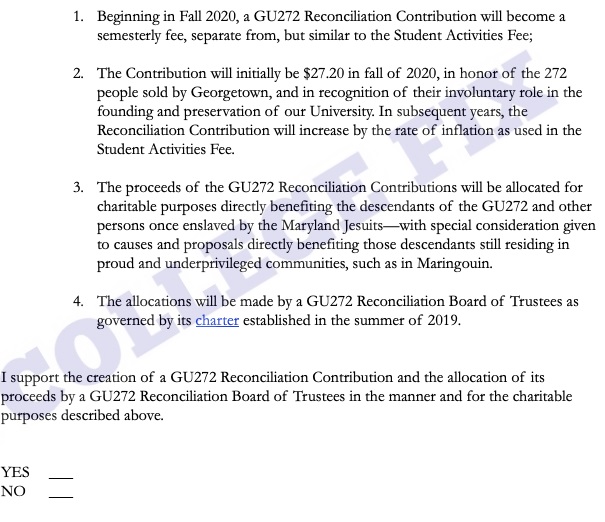The College Fix reports that students will be voting on a referendum that would create a fund to pay slavery reparations.
Georgetown University students will soon vote on whether they want to tax themselves to benefit the descendants of slaves sold by the university in the 1830s.
Its student government recently authorized a campuswide student referendum on whether to establish a fund for the families of the 272 men, women and children sold by Georgetown in 1838.
If approved, the semesterly fee would begin to be collected in the fall of 2020 and start at $27.20 per student “in honor of the 272 people sold by Georgetown,” states the student government resolution approving the referendum, a copy of which was obtained Wednesday by The College Fix.
“The proceeds of the GU272 Reconciliation Contributions will be allocated for charitable purposes directly benefiting the descendants of the GU272 and other persons once enslaved by the Maryland Jesuits — with special consideration given to causes and proposals directly benefiting those descendants still residing in proud and underprivileged communities,” the resolution stated.
The student government resolution approving the campuswide referendum was passed Feb. 3 by a vote of 20 in favor and 4 against, and with that the student body vote will occur in April alongside the annual student government elections, according to the resolution.
Over the past few years, Georgetown has undertaken a plan to reckon with the legacy of slavery at the private Catholic institution. In 1838, the university sold 272 slaves to pay off its debts. It officially apologized for the sale in April 2017.
In seeking to make amends, campus officials have also renamed two buildings on campus named after the Jesuits who were involved in the sale of the slaves and created an African American Studies Department and a working group on the establishment of an Institute for the Study of Racial Justice. The university has also agreed to “offer an admissions edge to descendants of slaves as part of a comprehensive atonement” for the school’s past actions.
But the student government resolution stated that’s not enough.
“In the fall of 2016, the Georgetown University Working Group on Slavery, Memory, and Reconciliation published its report and recommendations for how the University should address this shameful history. To date, Georgetown has implemented only some of them,” the student government resolution stated. “Among the recommendations left unfulfilled are the establishment of financial aid for the descendant community, the creation of public memorials to the enslaved persons, and the continuation of the ‘Freedom and Remembrance’ Grant Program.”
“As students at an elite institution, we recognize the great privileges we have been given, and wish to at least partially repay our debts to those families whose involuntary sacrifices made these privileges possible.”
UPDATE: Resolution passes
A referendum to recommend the creation of a reconciliation fund to benefit descendants of people enslaved by Georgetown University passed on April 12. The referendum recommends the establishment of a $27.20 fee to be collected from students each semester to be used to benefit the descendants of the 272 slaves sold by Georgetown in 1838 to keep the university financially afloat. The referendum passed by 1,237 votes, the GUSA Election Commission announced at 12:46 am on their Twitter page.
After a 26 hours of voting from Wednesday through Thursday, 57.9 percent of students voted in the election, which also included the election of 18 GUSA senators. Last year, with only the senate election on the ballot, turnout was 23 percent, per the Election Commission.
If accepted by Georgetown’s board of directors, the contribution will be included with other mandatory fees such as students activities fee, added to student tuition each semester. Though it would begin at $27.20 as an acknowledgement of the number of enslaved people sold in 1838, it would be adjusted each year to keep up with inflation. This is the first vote of its kind for an American university to decide whether students should collect and distribute funds to descendants of enslaved people in their school’s past.
The fee will be used to benefit any living descendants of the people sold, many of whom still live in or around Maringouin, Louisiana, near the location where the plantation to which the 272 people were sold in 1838.
Source: The College Fix, Georgetown Voice

